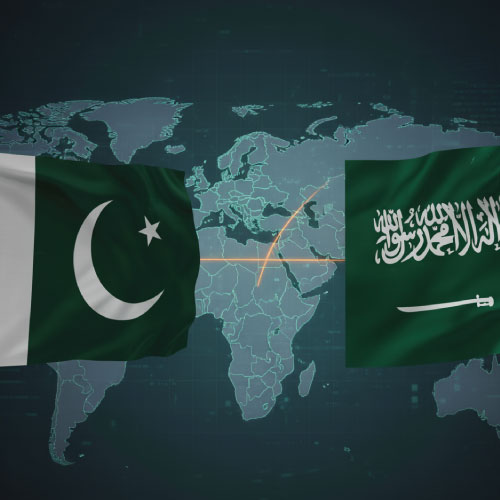The news of “Strategic Mutual Defence Agreement” signed between Pakistan and Saudi Arabia emerged as a trendsetter for the geo-political, strategic and security dynamics of Middle East and South Asia. This sovereignty-aligned mechanism is the only defence pact signed by Saudi Arabia, demonstrating Pakistan’s mutual trust and political will to build upon ‘connectors’, ‘compatibilities’, and ‘common aspirations’. This agreement was signed when the Middle East has become complex and volatile region, marked by competing strategic interests, evolved around regional dominance accelerating and fuelling proxy conflicts across the region. The region has seen various phases of thaw and active violent conflict but never of a positive peace, as described by Johan Galtung.
The ongoing conflict between Israel and Palestine remains a central issue. With the recent Israeli operations in Gaza having garnered international condemnation have further jeopardized regional peace. Moreover, there exist tensions over Palestinian statehood, and the Houthi-led insurgency, and the Israel-Iran coercive crisis are a few of the conflicts that are further undermining regional peace and stability. Representing a significant realignment, the Abraham Accords of 2020 normalized relations between Israel and some Arab states. However, the New Great Game in the region remains intensifying the regional security dilemma, greatly entrenched in historical fault lines.
To overcome this security dilemma, Pakistan and Saudi Arabia have materialised this defence deal to ensure “Security through Cooperation.” This concept has been developed and implemented by the West with considerable success. The theories of international relations explain it under the paradigm of alliance politics and constructivism. It is neither the first time nor the last one that two states due to convergence of interests decided to address their security threats collectively.
However, it is the first time that defence cooperation has been institutionalised between Pakistan and Saudi Arabia. This agreement is the result of well thought out threat perception overview, cost and benefit analysis, mutual compatibilities and strategic priorities demonstrating the mutual understanding for each other’s vulnerabilities and requirements.
Primarily the agreement stipulates that an attack on either country will be considered as an attack on both, obligating joint defense cooperation and collective action. Both countries have agreed to enhance security cooperation through joint military trainings, large-scale exercises, collaboration in defense technology and industries, and enhanced counter-terrorism strategies. The agreement aims to deter external aggression, promote closer cooperation in defense technology, and maintain regional stability. Notable without any mentioning of nuclear capabilities, non-conventional deterrence or transfer of nuclear technology.
The defense industry collaboration, with potential for technology transfer and co-production of military equipment, and capacity building and training, will improve the war fighting capacity of both countries, promoting indigenous production. The defence deal “offers potential avenues for investment in defense modernization.”. Moreover, there is no mentioning of nuclear umbrella at all and the defence deal remains within the conventional domain. The technological domains of “cybersecurity, drone technology, and space-based defense systems,” have been highlighted by the concerns. Here it would be pertinent to mention that the idea of defence industry collaboration is based on the concept of strengthening the “Defense Industrial Base (DIB)” that has potential to transform DIB as a proactive tool of deterrence and influence, as discussed by Prof. Dr. Deon Cynon in one of his articles.
The actual essence of the defence deal seems undermined due to problem of epistemology. The use of word “strategic” lead to the false interpretations regarding provision or possibility of “nuclear umbrella.” This opened a gateway to speculations, predictions and assumptions based on false interpretation. In his article, “New Saudi-Pakistan defense deal will have implications for entire region,” in Arab News Dr. Jamal Al Arabi, media Attaché at the Embassy of Saudi Arabia, Pakistan, explained the contours of this agreement. He left no stone unturned to clarify the fog of disinformation, intentionally created to dampen the significance and relevance of the agreement and to project it as a threat for regional security calculus contrary to what it actually is, a strategic stabiliser. He clearly stated that, “The newly signed agreement aims to expand military cooperation on multiple levels including joint military exercises to improve operational readiness and interoperability, intelligence sharing to counter emerging threats, particularly terrorism and cross-border insurgencies. Raising India’s fears regarding her self-assumed “new normal” in South Asia, Dr. Jamal Al Arabi further wrote, “it may heighten India’s caution in dealing with Pakistan.” India, being an irresponsible state actor should be more cautioned while violating Pakistan’s sovereignty under the premise of false stories as now Saudi Arabia will consider any attack on Pakistan as attack on her own soil and vice versa. This defence deal has further reduced India’s imaginary space for a conventional war under the nuclear threshold. Before fuelling conspiracies in this defence deal, Indian propagandists disguised as scholars and academicians should educate themselves on the contours of deterrence as start of full-scale war is end of deterrence and border skirmishes or strikes are not war. It is mainly due to deterrence that states opt for calibrated, controlled and calculated scale of war both vertically and horizontally. More importantly under any scenario, Pakistan and Saudi Arabia will collectively counter the threats to their comprehensive security.
Moreover, the deal mentions “terrorism,” and “emerging threats,” as potential avenues of cooperation, indicating upon cooperation to mitigate both traditional and non-traditional security threats. Here the question arises how both state will tackle the issue of weaponsiation of Water by India under the frameworks of terrorism and emerging threats? The idea of adaptive power explains that both countries intend to learn and improve through each other’s niche and experiences. The incorporation of elements of comprehensive security in the agreement would make it sustainable and rational while extending Pakistan’s military and diplomatic credibility across regions.
There should be no ambiguity on Pakistan’s nuclear doctrine, policy, posture & capabilities in the absence of any formal confirmation by both governments regarding extending of Pakistan’s nuclear weapons umbrella to any external region or country, including Saudi Arabia. The speculators should know that there are no doctrinal changes as a matter of operational nuclear weapons usage policy, a basic toolkit to implement the operational aspect of nuclear weapons.
Political signalling of coercive strength to deter potential threats is not a de-facto nuclear protection guarantee. Strategic communication is an important determinant of “deterrence credibility,” and Pakistani officials are skilfully trained to handle the sensitive and complicated domain of nuclear policy and posture.
Pakistan’s official nuclear doctrine remains one of full-spectrum credible deterrence against threats to the Pakistani mainland, and do not extend any nuclear deterrence umbrella to the Middle East region or any other country thereof. There is no change in Pakistan’s nuclear policy resultantly her nuclear posture remains sovereign, India-centric, and anchored in well-established, secure, and safeguarded command-and-control practices and strategic-level warfare capabilities, well endorsed by International Atomic Energy Agency (IAEA).
That is why none of the major and middle powers have issued any official statement on the Pakistan-Saudi defence agreement and refrained from any premature speculations while considering the agreement as a bilateral arrangement to institutionalise cooperative security to address short term and long-term security concerns. Moreover, the USA have similar defence deals or agreements with several countries while having strategic partnerships with Pakistan and India but did anyone ever assumed that “nuclear guarantees/Umbrella” is included? Doesn’t any such speculation are only part of disinformation campaign with malafide intentions?
In geo-political realm, although Pakistan has emerged as a trusted partner and leader in the Muslim world, enhancing its standing as a pivotal player and balancing actor in regional security and Saudi Arabia has diversified her defence cooperation to strengthen her security and defence. This agreement will potential facilitate in sustaining Pakistan’s strategic aims of deterrence, industrial resilience, military readiness & modernisation, economic security and strategic stability.
The author is Executive Director, Center for International Strategic Studies, AJK, Pakistan. She is the only female to head a think tank of National Command Authority (NCA). She is also former head of the department of Strategic Studies, NDU, Islamabad. Her book “Shaking Hands with Clenched Fists: The Grand Trunk Road to Confidence Building Measures between Pakistan and India,” is highly acclaimed worldwide. She is a frequent media commentator.
Author can be reached on X (Twitter) @AsmaKhawaja5

